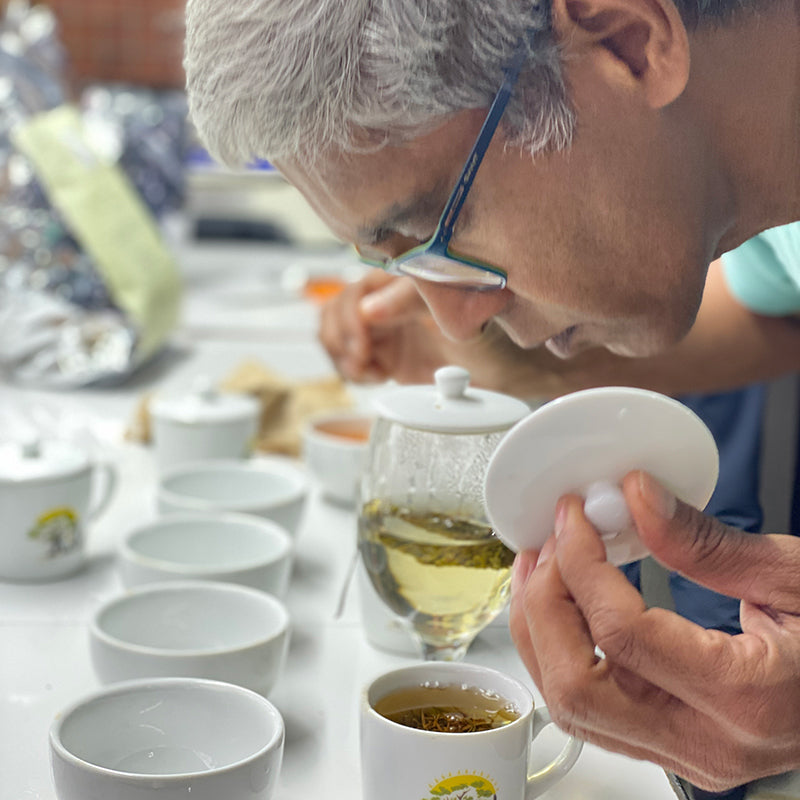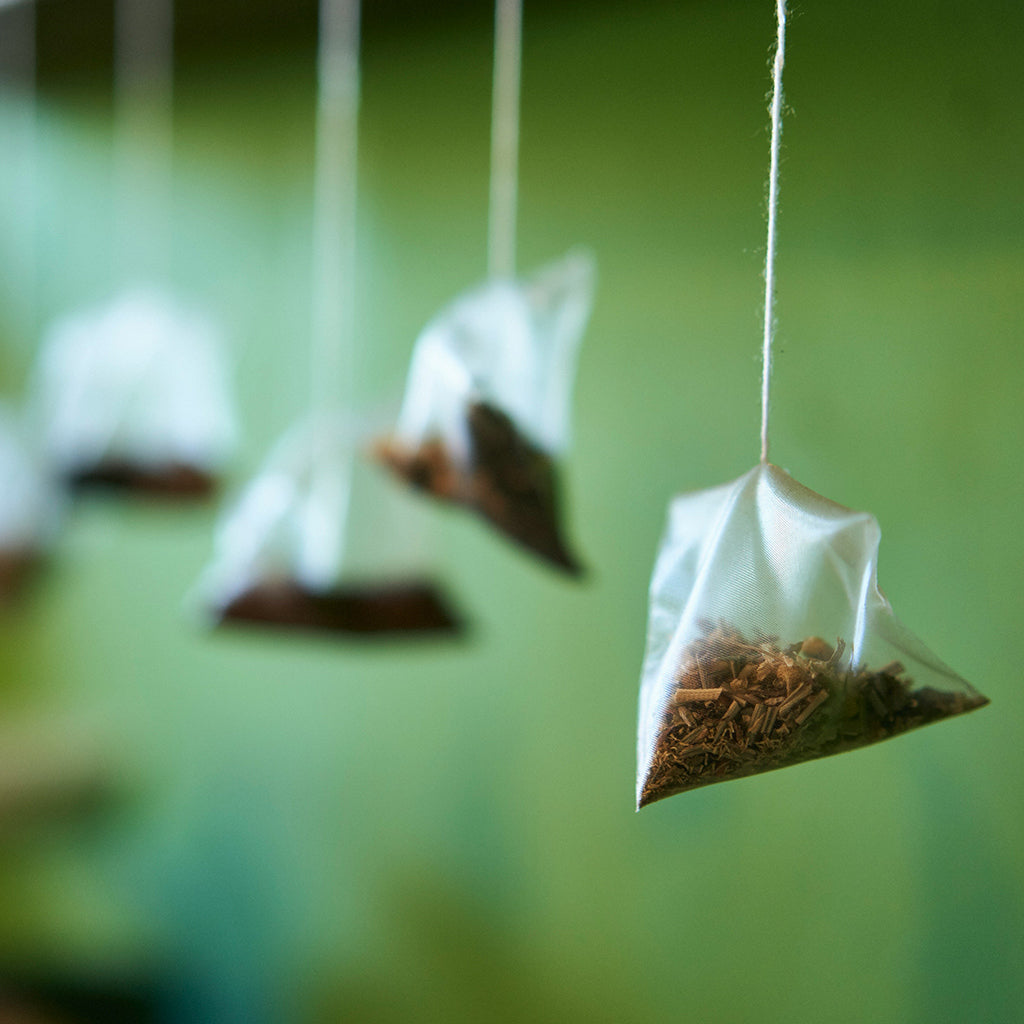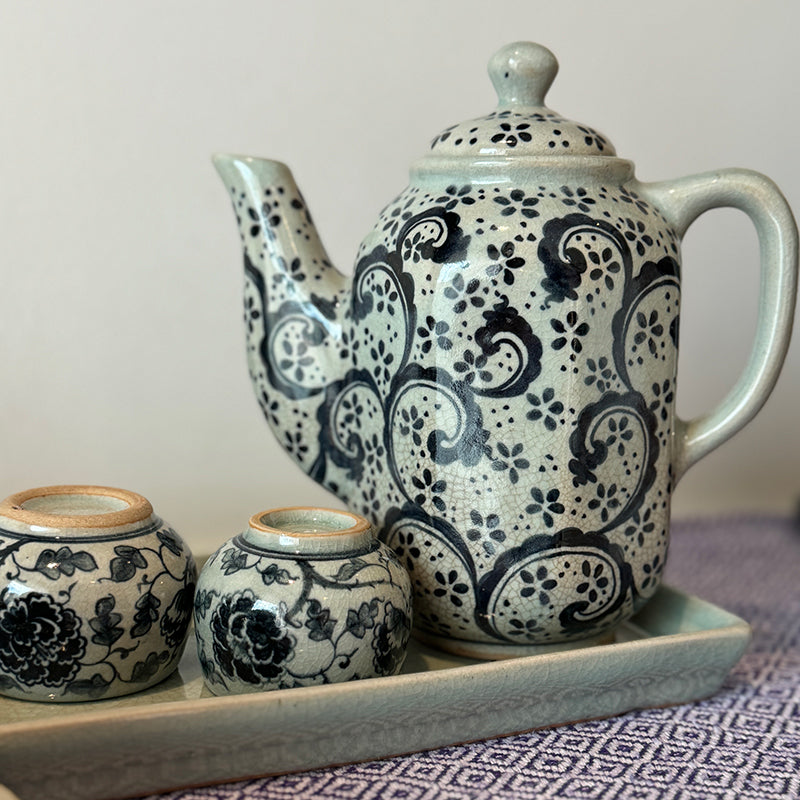At Picker's Pocket there's always a story
Our Lemongrass tisane & an invention from an old washing machine.
Ashok’s dream was to be an inventor... He was the most intelligent child in the entire district in Sri Lanka that he grew up in, however, due to the government placing unqualified teachers in tea estate schools and parts of the curriculum being held back (as an incentive to make parents pay for it which they just can’t afford to do), he sadly failed his exams, like the majority of children from tea plantations.
With a vision to empower employees, AMBA estate tea has encouraged him to showcase his skills, hopes and dreams. Ashok, has just invented a lemongrass chopper! This is now being used to cut our lemongrass on the plantation.
Can a tea really change colour? Introducing 'Chameleon Tea'
When we add the butterfly pea flower (& all its health benefits) to our lemongrass above we have an organic blue tea which changes colour. The brew is aqua, soda water changes it to a deeper royal blue & lemon to a pink.
Have a bit of fun with lemon ice cubes and watch closely as the colour swirls out...
Steeped in Tradition - Vangedi Pekoe (“Thieves Tea” or “Illegal tea”)
Vangedi Pekoe is also affectionately known as Thieves' Tea as this traditional method of processing was carried out in the kitchens of the plantation workers with leaves that had made their way into their pockets.
Leaves are pounded in a stone “vangedi” (mortar) before oxidising and drying. It’s illegal to make this tea on the big estates since it means the workers must be “pocketing” the leaves!
Amba is the only estate to make this tea commercially. This is one of our favorite teas. We don't think there is anyone who would know how to brew tea better than the pluckers who harvest the leaves daily!
Ancient methods- Mini-Rolled breakfast tea & tea base for Sumudu Chai
After air drying the tea leaves are circulated in the mini roller. This is done over a kithul wood base in small batches to maintain the integrity & flavours of the leaf. Timber for the estate is used to heat the drying room for the next step in the process.
The following is from AMBA Estate on processing equipment;
Beyond local employment, materials and services, we also try to source all of our materials and equipment from within Sri Lanka.
When we first started equipping our tea and herb processing facility, we were told that we would have to import our mini tea-roller and mini-drier from China. However, we persisted in our search and eventually found two local engineering firms in Sri Lanka who built us custom-made equipment, using specs from a local tea-production expert.
In doing so, not only do we generate direct revenues for local companies, but we also hope to stimulate local skills and sow the seeds for future industry clusters. Both companies are now planning to use these products as prototypes to begin selling similar equipment to other small-scale agro-processors in Sri Lanka.
Value for money, why you can re-brew out tea leaves
Our teas are larger leaf, quality teas & able to be rebrewed with full flavour coming through on the 2nd & 3rd brews. Processed teas & the likes of tea bags can’t be rebrewed as they have lost so much of the flavour in the plucking & processing. Highly processed teas use leaves that are inferior in quality, as well as stems. Teas that are machine harvested are basically pruned.
With our re-brews, pour all the water off the leaves after the first infusion, then you can add more water for a second or third infusion – in fact, the 2nd and 3rd infusion should taste even better than the 1st.
In Morocco, they pour the first infusion on the floor and only drink the later infusions; and in Japan, it is sometimes said “The first infusion is for your enemies, the second is for your friends, and the third is for yourself”.
An abandoned tea plantation - The home of Wild Tea!
Our Forest Hill plantation is a 130 year old abandoned tea plantation at the foot of the sacred Adams Peak. The wild tea trees are now 40 foot high, the leaves are accessed by climbing the trunks by foot or bamboo ladder. They are plucked by hand and then carted out of the jungle by foot. It may not be the quickest way to secure a harvest but the focus at Forest Hill is not on speed. It’s firmly on quality and about producing a unique small batch tea.
This tea has been brewing for 130 years so there is no need to rush the finale. Take your time, savour the flavour and close your eyes. It is wild ceylon tea at it’s very finest and a rare taste you cannot find anywhere else.
The tea trees at Forest Hill will see little of mankind's technological advance. Led by Buddhika Dissanayake, a local tea maker, the abandoned trees are treated with the respect they deserve. This means no mechanisation. It’s an approach that preserves the taste and character of the tea they are now once again producing. An intangible something, there is an intrigue and beguiling character to the taste. You can’t quite put your finger on it but it’s there.
Whilst they are not certified organic (which takes time and this is a considerably new operation), Forest Hill adheres to organic principles. More so, they are committed to actively preserving and increasing the biodiversity of the region. So it’s not as much about taking from nature by plucking the tea leaves, rather it’s a partnership with nature, one in which they give back and understand success is based on mutual benefit for man and land.
Innovation - Natural Tea Rod (The first natural tea bag in the world)
From the same wild estate we source our ‘Tea Rod’, a 100% natural tea bag. It may even be the most sophisticated tea bag in the world. Each ‘Tea Rod’ consists of two high quality leaves and buds, entwined together to form a ‘rod’. The unique construction means each part of the rod contains slightly different flavour notes.
It is showcasing tea craftsmanship as an art and performance piece. These tea rods are the first of their kind in the world.
True Artisans
One of our goals is to promote the sale of hand-crafted teas made in Sri Lanka. By doing so, we hope to increase the variety of amazing Ceylon teas available to tea-lovers around the world, and to increase the incomes of small farmers and workers who grow Sri Lanka's famous teas.
Sri Lanka is rightly famous for producing some of the world’s best teas, under the Ceylon Lion logo. However, the vast majority of these teas are produced in large factories and sold at auction – much of it destined for mass-produced blends and tea bags.
Since artisanal teas are produced by hand by the farmers themselves and sold directly to some of the finest retailers and restaurants around the world, this will be great for Sri Lanka’s exports and for farmers’ incomes.




